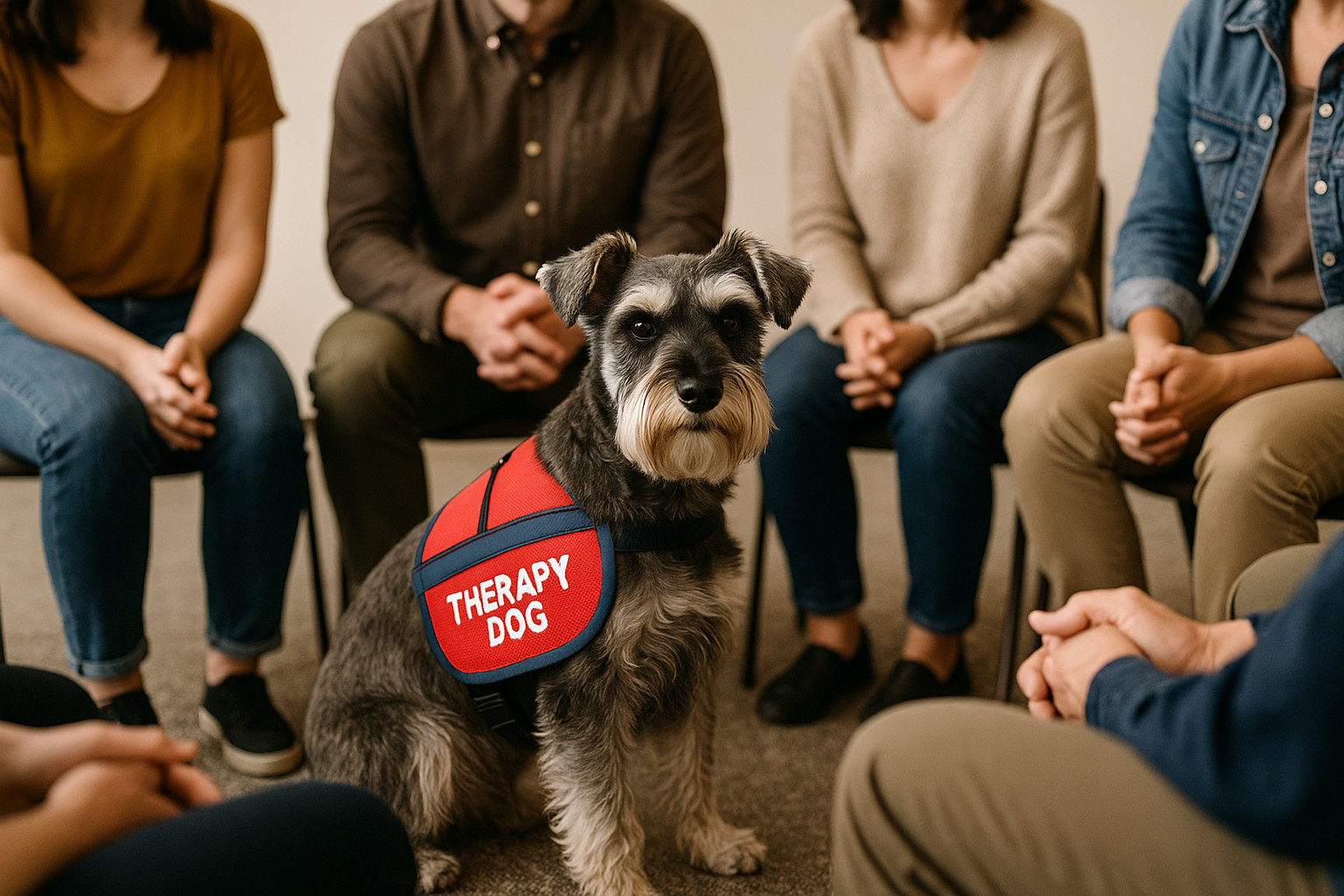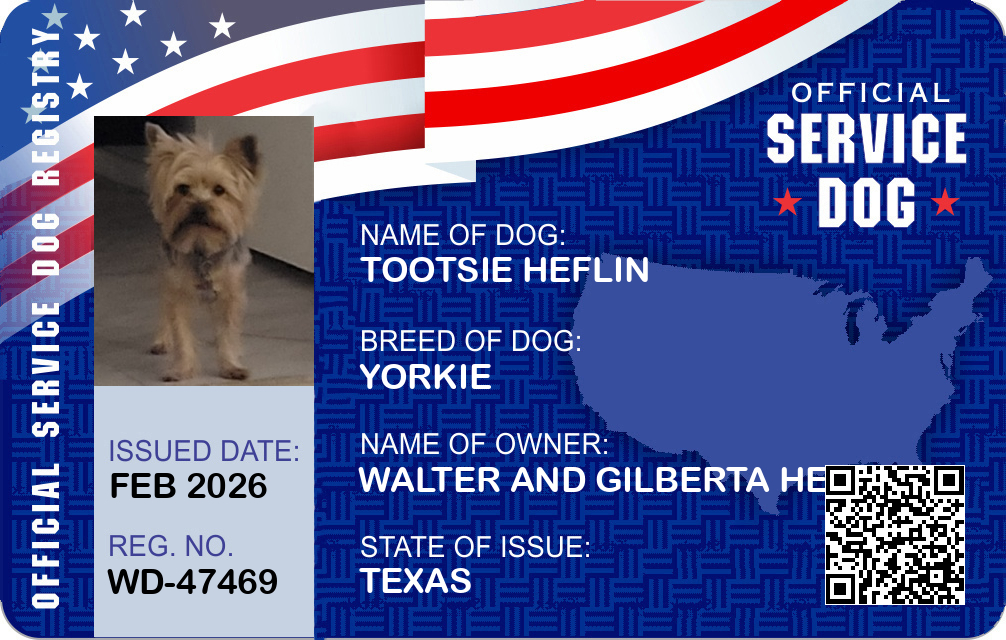Miniature Schnauzer as a Therapy Dog
Get Your Documents

Miniature Schnauzer as a Therapy Dog Overview
Miniature Schnauzers, with their spirited personalities and robust adaptability, emerge as a compelling breed for therapy work. Their distinctive traits, notably their intelligence and affection, equip them well for the demands of interacting empathetically with diverse populations. As we explore the merits and considerations of utilizing Miniature Schnauzers in therapy settings, it becomes evident how their unique combination of physical, emotional, and behavioral characteristics can bring comfort and joy to those in need.
Understanding the Therapy Dog Role
Therapy dogs play a pivotal role in providing emotional support, enhancing well-being, and even aiding in recovery processes. These dogs are selected for their temperament, trainability, and ability to adapt to various environments and interactions. Unlike service dogs that perform specific tasks for individuals, therapy dogs offer general emotional and comfort support to people in settings such as hospitals, schools, and nursing homes. Success in this role hinges on the dog’s temperament, adaptability, and the ability to remain calm in often dynamic or stressful environments.
Physical Appearance and Energy Level
The Miniature Schnauzer is a compact, sturdy dog that typically weighs between 11 to 20 pounds. Recognizable by their distinctive beard and eyebrows, they exude an air of alertness and intelligence. While their appearance is striking, it is their size and adaptability that equally contribute to their therapy suitability. Being small yet robust allows them to comfortably interact with people in close quarters, such as hospital bedsides or small therapy rooms.
In terms of energy, Miniature Schnauzers are moderately active. They possess enough energy to engage enthusiastically with clients, yet they generally maintain composure, a balance that is crucial for therapy settings where quick movements or high energy may not always be appropriate. Their manageable size and balance of energy make them ideal for both high-energy interactions and quieter, more calming therapeutic moments.
Personality and Emotional Intelligence
Known for their lively and affectionate nature, Miniature Schnauzers possess a charming personality that easily endears them to humans. One of their standout traits is their emotional intelligence; they are adept at sensing the emotional state of those around them, making them especially effective in therapeutic encounters. Miniature Schnauzers often bond closely with humans, showing empathy and attention that are pivotal to successful therapy interactions.
Their innate curiosity and playfulness do not deter from their ability to remain focused and calm in therapy sessions. They possess a natural inclination to provide comfort, often leaning into humans or gently placing a paw on a person in need of assurance. This sensitivity to human emotions ensures they are particularly adept at calming anxious individuals or providing comfort to those feeling isolated or distressed.
Environments Where Miniature Schnauzer Excels
Miniature Schnauzers are versatile dogs that thrive in a range of environments, making them suitable for various therapy settings. Some of the key environments where they excel include:
- Hospitals and Nursing Homes: Their small size and calm nature make them ideal for visiting patients in restricted spaces, such as hospital rooms and nursing homes, where they can either sit quietly on a lap or be hugged.
- Schools and Libraries: Their playful yet manageable energy helps in engaging children in educational or relaxation sessions, such as reading programs.
- Rehabilitation Centers: Their supportive and patient personality can assist individuals in physical or emotional recovery, providing motivation and companionship.
These settings benefit significantly from the Miniature Schnauzer’s adaptable nature, where their presence can bring joy, reduce stress, and enhance the therapeutic experience.
Common Therapy Settings
Exploring common therapy settings reveals the adaptability required of Miniature Schnauzers and highlights their suitability. These settings include:
- Pediatric Care: In children’s hospitals or clinics, Miniature Schnauzers ease anxiety and promote quicker recovery through playful interactions and gentle companionship.
- Behavioral Health Facilities: Their empathic nature allows them to connect effectively with individuals dealing with mental health issues, providing non-judgmental support and companionship.
- Elderly Care Facilities: In nursing homes, they offer companionship and nostalgia, actively engaging residents in reminiscence therapy and group activities.
Their ability to adapt quickly to these varied settings ensures that they can meet the emotional and physical demands placed upon them in different therapeutic environments.
Interactions with Different Populations
The Miniature Schnauzer’s appeal lies in its ability to interact seamlessly with diverse populations:
- Children: Their playful demeanor balanced with a calm approach makes them approachable and engaging for children, aiding in therapy for anxiety, autism spectrum disorders, or recovery post-surgery.
- Adults: Whether providing stress relief at corporate wellness events or assisting individuals coping with mental health challenges, their adaptable nature makes them suitable for adult interactions.
- Elderly Individuals: Their ability to provide gentle affection and warmth is particularly comforting to the elderly, offering companionship and supporting cognitive activities.
Their ability to adjust their behavior according to the needs of their human counterparts is a testament to their suitability as therapy dogs.
Health and Wellness Factors
The overall health and wellness of a therapy dog are paramount for maintaining their effectiveness in therapeutic settings. For Miniature Schnauzers, attention to their diet, exercise, and regular veterinary care is essential. They are prone to certain hereditary health issues, such as pancreatitis and eye problems, which require monitoring to ensure these do not impact their ability to perform therapy work.
Routine grooming is another aspect to consider, as their wiry coat requires regular trimming and maintenance to prevent tangles and matting. Cleanliness and a well-kept appearance are not only hygienic but also part of making them approachable and comforting to therapy clients.
Lifespan and Common Health Issues
With a lifespan of approximately 12 to 15 years, Miniature Schnauzers have the potential for a long therapy career, provided their health is vigilantly monitored. Common health issues include:
- Skin problems: Regular grooming can help manage and reduce occurrences.
- Eye conditions: Periodic veterinary check-ups can help catch and address issues early.
- Minimizing stress: Ensuring they are not overworked or placed in overly stressful situations helps maintain their overall health and mood.
Proactive health management ensures that Miniature Schnauzers remain healthy and capable of providing consistent therapeutic support throughout their lives.
Maintenance and Care Needs
For those considering Miniature Schnauzers in therapy roles, understanding and committing to their maintenance needs is crucial. These needs involve:
- Regular Grooming: To maintain their iconic looks and ensure cleanliness, particularly important in healthcare settings.
- Balanced Diet: Tailored nutrition helps prevent common breed-specific health issues.
- Consistent Exercise: Necessary to manage their moderate energy levels while ensuring they remain calm during therapy sessions.
Meeting these needs contributes to the dog’s ability to perform reliably in therapy environments and ensures they remain healthy and happy.
Training and Certification Readiness
Miniature Schnauzers bring an eager and intelligent approach to training, making them suitable candidates for therapy certification. They respond well to positive reinforcement training methods, which enhance their natural desire to please. The process involves:
- Basic Obedience Training: Establishing foundational skills, such as sit, stay, and come.
- Socialization: Exposing them to various environments and social situations to build confidence.
- Specific Therapy Training: Focuses on behaviors and responses in therapeutic contexts, such as remaining calm and responding appropriately to emotional cues.
Their responsiveness and keenness to engage with humans make the training process both rewarding and effective.
Learning Style and Responsiveness
Miniature Schnauzers thrive on mental stimulation, making them quick learners when training is both structured and engaging. They are particularly responsive to structured training sessions that incorporate toys and treats as motivators. Their learning style is marked by:
- Curiosity and Focus: They approach new tasks with curiosity and maintain focus once engaged.
- Adaptability: They adjust their learning pace to suit different activities, whether lively or calming.
- Problem-Solving Skills: Encouraging problem-solving enhances their cognitive engagement and responsiveness to complex tasks.
These traits make them adept learners, quickly adapting to the requirements of various therapy situations.
Handling Social and Emotional Stimuli
Miniature Schnauzers are notably sensitive to social and emotional stimuli, traits immensely important for therapy work. They excel at:
- Reading Emotional Cues: Understanding human emotions allows them to respond with appropriate actions, such as snuggling close to an upset child or offering a calming presence.
- Social Navigation: Their comfort in varied social settings ensures they handle group sessions or one-on-one interactions well, continually adjusting their behavior to the individual needs of those around them.
- Remaining Present: Their ability to stay in the moment helps them bring calmness and peace to environments that are emotionally charged.
This responsiveness contributes significantly to their effectiveness as therapy dogs.
Strengths, Limitations, and Ideal Roles for Miniature Schnauzer
While the Miniature Schnauzer possesses many qualities advantageous for therapy work, it is important to recognize both their strengths and limitations:
- Strengths:
- High emotional intelligence enhances interaction quality.
- A charming, approachable demeanor fosters easy connections.
- Adaptability to different environments and populations.
- Limitations:
- Potential health concerns require diligent management.
- Higher grooming needs demand commitment.
- Ideal Roles:
- They thrive in roles requiring gentle emotional support and active engagement, including pediatric therapy, elderly care, and educational settings.
Final Thoughts
The Miniature Schnauzer undoubtedly possesses many of the necessary traits that make a successful therapy dog. Their eagerness to connect with humans, coupled with intelligence and emotional acumen, provides a strong foundation for emotional support work. With proper care, training, and ongoing health management, they can flourish in various therapy roles, bringing joy and comfort to those they assist.
Key Takeaways for the Miniature Schnauzer as a Therapy Dog
- Best suited for: Emotional support in pediatric, educational, and elderly care settings.
- Not ideal for: Environments requiring extensive physical work or minimal grooming time.
- Temperament highlights: Affectionate, intelligent, and highly adaptable.
- Care and health notes: Regular grooming and proactive health care are essential.
- Therapy environments where they shine: Hospitals, schools, nursing homes, and rehabilitation centers.
Get Your Documents
Example State Cards













